| | | | | |  | | | | | | | | | | | The Power to Create Healthy Cultures Lies Within Each of Us Thank you, to everyone who continues to dedicate their work to serving others and meeting diverse needs in health care, specifically mental health needs. It has always taken the sheer will and passion of dedicated people to address persistent barriers. Today, it feels as if more barriers than ever are facing us as some key policy makers want to close pathways to equitable health care, protections for LGBTQ+ individuals, immigrant communities and all people of color, and even the health of our planet. | To be honest, we have not made the progress we need to or want to in any of these realms, even today. We have not yet held ourselves collectively to the highest standards in understanding, preventing, or breaking through bias. But many of us are trying and striving for that. We must not abandon these efforts, or the critical programs and services needed, because of fear and confusion brought on by road blocks and changes in policies that, admittedly, make our lives and our work harder. Of course, reduced funding can have major impacts on the programs and services we work so hard to provide, but we need to keep fighting and we need to go deep below the surface of policy issues. It's not just about policies on paper. It’s about actions – real work on behalf of real people trying to make a positive difference for everyone. Even if some abandon DEI policies per se as a plan on a piece of paper or directions in digital documents, we’re missing the point. Diversity is about embracing the wonderful, beautiful, powerful differences everyone offers. Even without a written policy, we can celebrate this diversity of views and experiences that enrich us through age, ethnicity, gender, physical ability, race, religion, sexual orientation, and other aspects of social identity. Equity isn’t just a term, it’s a value. We don’t need a policy to break down inequities if we truly live and practice understanding, listening, empathy, compassion, and treating everyone with respect and dignity by offering equal opportunities. A policy is redundant if we are Inclusive in respecting everyone’s voice and creating a culture in which people from all backgrounds feel empowered and encouraged to express their point of view and a culture where everyone truly feels heard and valued. We must provide people the space and the respect to share their lived experience and to raise their concerns – and we need to truly listen if we want to fully understand. Please don’t lose heart. Please don’t stop challenging stereotypes and misconceptions. Please keep the passion and the support of one another to replace these archaic dogmas with understanding and empathy. Policies alone do not change cultures – creating the healthy cultures we value changes policies. | | | | | Maureen Greeley
Executive Director | | | | | | | | | | 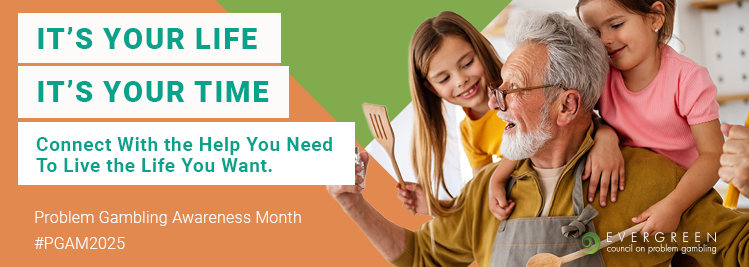 | | | It’s Your Life. It’s Your Time. March is Problem Gambling Awareness Month (PGAM) and ECPG continues its commitment to increasing awareness and hope among the general population and underserved communities. Stay Tuned! The 2025 PGAM Washington State campaign will run March through May and will engage with audiences digitally and on social media. More Details to Come! Gambling Disorder Screening Day (GDSD) Tuesday, March 11, 2025 Gambling Disorder Screening Day (Screening Day) is a one-day event held annually on the second Tuesday of March during Problem Gambling Awareness Month. | | | | | | | | | | 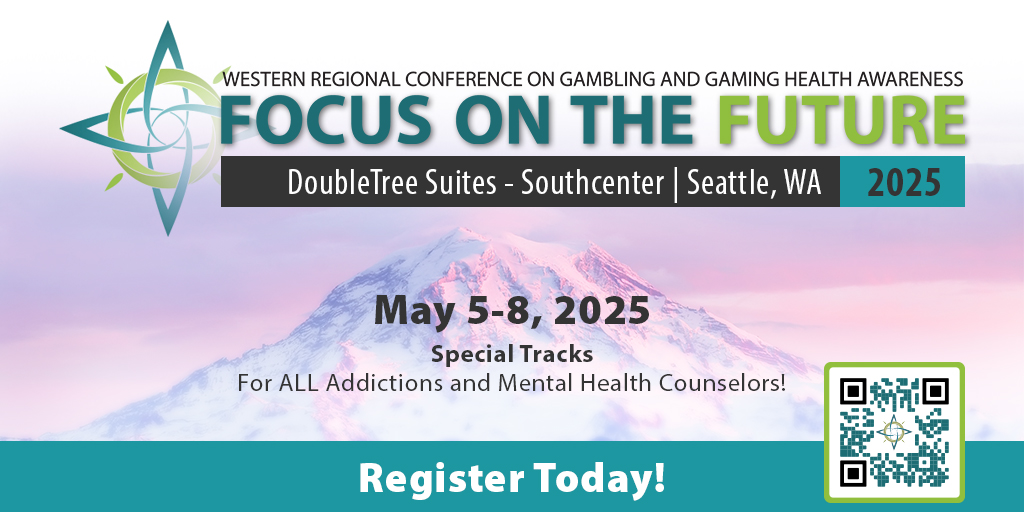 | | | Reserve Your Hotel Rooms Now – Special Rates Available through April 11, 2025. The value of lifelong learning and professional development cannot be underestimated. The more we learn and share as colleagues in the fields of addiction, mental health, prevention, and recovery supports, the more we enhance the quality of the services we provide. Focus on the Future is back this Spring – May 5-8 at the DoubleTree Suites Southcenter, Seattle – with outstanding workshops, keynote presenters, and a wide variety of breakout sessions. Here are just a few highlights. For the full conference schedule, registration, and scholarship information, click here. Early Bird discounts on registration are available through April 18, 2025. Featured Presentations | | ASAM 4th Edition, Vol. 1 – What Has Changed? Washington State will soon be adopting the new ASAM Criteria guidelines. In Oregon, providers are advised to ensure they are able to move forward with the implementation of The ASAM Criteria, Fourth Edition, effective July 1, 2025. The ASAM Criteria is the most widely used set of evidence-based standards when determining appropriate treatment criteria and levels of care for substance-related and co-occurring conditions. Presented by:
Paul Hunziker, MA, LMFT, SUDP
Thanks to the support of the Northwest Addiction Technology Transfer Center (NW ATTC) | | | | | | The Evolution of Motivational Interviewing We are excited to bring Dr. William R. Miller, one of the founders of Motivational Interviewing (MI) to Focus on the Future 2025! Don’t miss this opportunity as Dr. Miller shares unique insights into the evolution of MI over several decades. Many of us use Motivational Interviewing in our work and our lives as it has expanded from its use with SUD and behavioral disorders into the fields of public health, medical care, criminal justice, education, sports, and family systems. Join Dr. Miller to learn how MI continues to evolve and how it supports many treatment methods. Presented by:
William R. Miller, PhD | Co-Founder of Motivational Interviewing | | | | | | A Deeper Dive into Stock Market and Financial Tech Trading – Is it Gambling? The appeal of high-risk, speculative investments is real for many people. The distinction between investing and gambling can be subtle and subjective. Whether you view financial trading from an investing lens or speculating as gambling, the risk of gambling-related harm among financial traders appears to be amplified by new financial technologies, which have increased access to riskier financial assets and have encouraged riskier trading behaviors. Dr. Tim Fong is always one of our most popular presenters – join us at Focus on the Future as he shares this deep dive into an important topic. Presented by:
Timothy Fong, MD | Co-Director of the UCLA Gambling Studies | | | | Joint ECPG ASSOCIATE / NCPG MEMBERSHIP Not yet an ECPG Associate? Click Here for More Information and Application Take advantage of our Joint ECPG Associate/NCPG Membership – join both and save! As an ECPG Associate, you’ll receive discounted rates on all our trainings and conferences – all of which offer Continuing Education Units from many associations and certification boards. You do not have to be a Washington State resident in order to be an ECPG Associate. | | | | | | 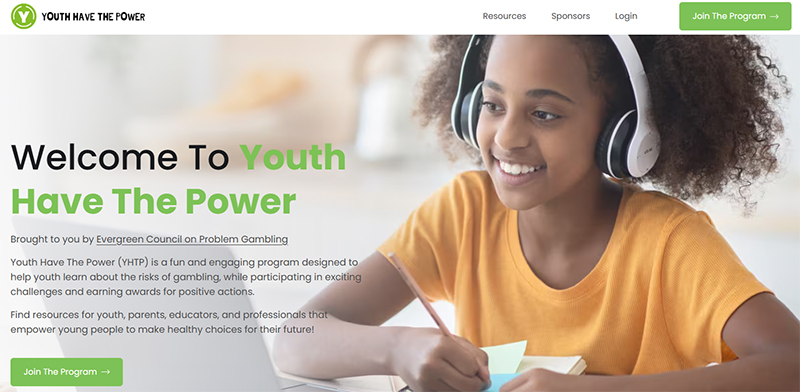 | | | Parents and involved adults compete against many obstacles in raising healthy children. There is an endless supply of outside influences, and it can be difficult to prioritize the life lessons we wish to impart to youth. Plenty of resources and information exist to help guide us, but there can be a lot of uncertainty in knowing what to use. Many adults believe that educating young people on gambling harms is unnecessary if they can’t legally access gambling, but the reality is that risk factors for problem gambling can start very early in life. At ECPG, we’re proud to introduce a new program that aims to bridge this gap in youth prevention – Youth Have the Power. Youth Have the Power (YHTP) is an online resource for parents, educators, and young people to find high-quality information on gambling risks. On the main website you’ll find tools and links to vetted resources on gambling, video gaming, and behavioral health. | | 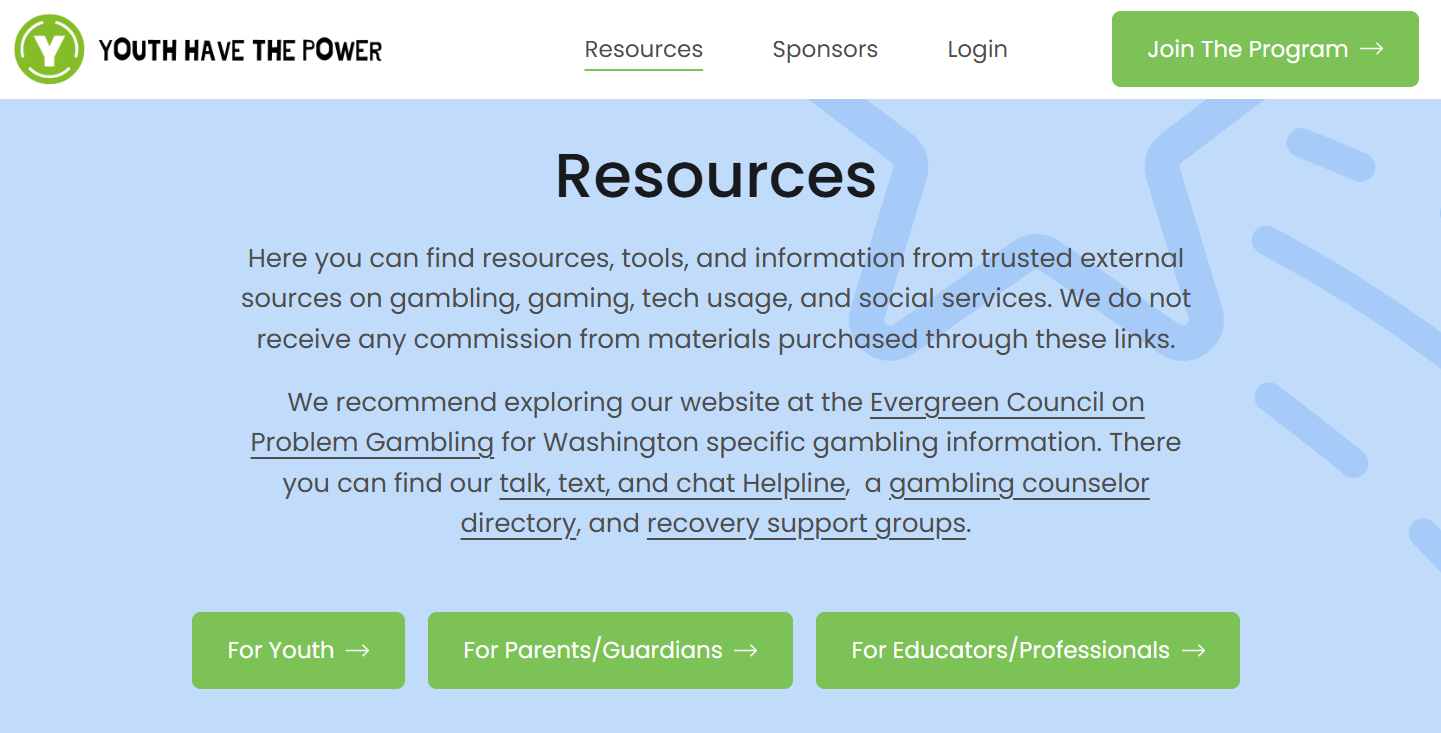 | The launch of YHTP also introduces a dynamic, interactive program that awards youth for learning and engaging in their communities. By signing up, participants ages 9-24 can earn awards by completing Challenges and embarking on a self-guided learning journey through the Curriculum. The age-appropriate content delves into what is gambling, what is addiction and how can someone be addicted to gambling, help resources, and explains the link between video gaming and gambling. We know that education is an important part of prevention, but it can’t be the only tool in our toolbox. Youth Have the Power also aims to build protective factors in our participants’ lives through our Challenges. Challenges are opportunities for personal growth and community engagement. Each completed Challenge earns points, which then can be redeemed for family-friendly activities in the participant’s community. There is NO randomization in this program. The point system is based on a job and store model, where the point value for challenges and awards is clearly marked. Participants can save their points to redeem their desired award, which in turn provides a bit of financial literacy IRL (in real life.) We have a wide variety of Challenges for youth to try out! | | Join Us in Making a Difference Youth Have the Power is a collaboration between ECPG, youth, and the community! If you are interested in supporting this program, we are looking for the following help: -
Businesses and organizations in Washington willing to donate tickets, passes, gifts, or other items to serve as awards for participants. -
Current Community Partners include the Hands On Children’s Museum, Jefferson County Historical Society, Tacoma Museum of Glass, Centralia Rollerdome, Port Angeles Fine Arts Center, Wolf Haven International, 23 Kitchens, The Great Wolf Lodge, Benihana, and K1 Speed. | | | | | | | | | | 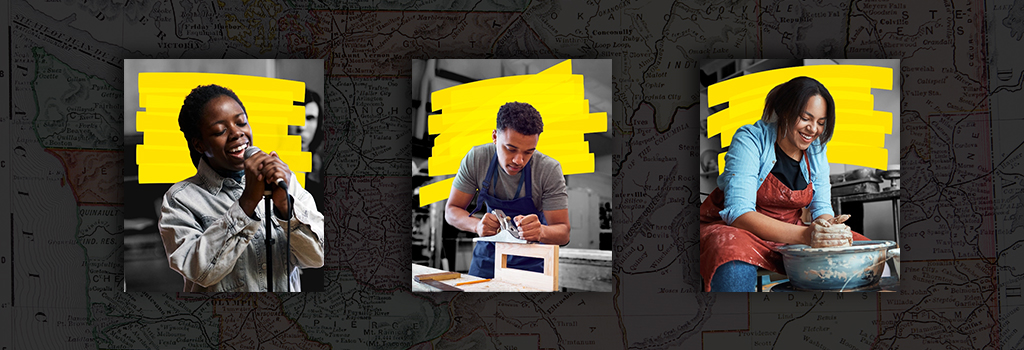 | | | ECPG is excited to launch a project long in the works – the new Black Community Advisory Committee! We still have openings for volunteers to help guide our efforts toward gambling disorder recovery equity for all. We are looking for individuals who are trusted community leaders, eager to help influence positive impacts in behavioral health equity for black communities, and available to collaborate with like-minded individuals from diverse backgrounds. We are seeking people who: Please use this list as a guideline, not as strict conditions, it is the life and expertise of the individual volunteers that make the community advisory committees so incredibly valuable in helping ECPG to make real and lasting change. What are Community Advisory Committees? Our mission at ECPG thrives on empowering people to achieve a state of well-being and health. We understand that everyone’s journey is incredibly diverse and that our work requires sensitivity in representing these varied experiences. Our Advisory Committee volunteers share experiences, insights, and knowledge that are vital to helping ECPG offer and enhance programs that meet the needs of diverse communities. Current advisory committees have helped to create the Spanish ECPG webpage with many of the Spanish-language screening tools and resources included there, hold community events, decide on YouTube video and podcast outreach/education topics to help specific communities, increase reach and impact of Problem Gambling Awareness Month and Gambling Disorder Screening Day, consult on culturally-appropriate imagery, colors, language, messaging, current trends/gaps/needs, and more. How to Join Interested applicants can fill out a short online application found at the bottom of our Culture and Community page. Spots may be open on other advisory committees, so we encourage you to apply to the group to which you feel most connected! | | | | | |  | | | Funding Support for Providers and Clients ECPG works with partners to find new and improved ways to help provide support for peers and counselors to obtain education, training, and credentialing to better serve those impacted by gambling-related harms. Thanks to contributions from Tribal Nations, the Washington State Problem Gambling Program, and Recovery Café Network. Here’s an overview of the support available, click the links below to learn more. | | | | | | | | Free Training Registration Hotel stipend for in-person events Peer, Prevention, Student, Teacher, and Treatment Provider ENHANCED Scholarships for new Gambling Counselors in Geographical gaps and BIPOC communities View Training Scholarship Details | | | | | | | | Treatment and Supervision Reimbursement | | Reimbursement for supervision costs Outpatient/Intensive Outpatient reimbursement Residential reimbursement Contact for more information:
Tana Russell, trussell@evergreencpg.org | | | | | | | | | | | |  | | | In January 2025, the National Collegiate Athletic Association (NCAA) released an Executive Summary of its latest study on more than 100,000 student athletes across the United States. Over the course of five study iterations (2004, 2008, 2012, 2016, and 2024), student athletes in three NCAA divisions were surveyed anonymously about their attitudes toward and engagement in various gambling activities, including sports betting. This includes 21,450 student-athletes in the 2024 study. Note: A 2020 student-athlete survey was abandoned in its early stages because of the COVID-19 pandemic. Study investigators are Thomas Paskus, Ph.D., of the NCAA research staff, and Jeffry Derevensky, Ph.D., of McGill University. Here is a brief overview of the findings from the 2024 study. Click here for the full Executive Summary. 2024 Survey Findings Highlights -
When we examine how many NCAA men engage in sports betting frequently, a more nuanced and concerning story emerges. Slight decreases were observed in the percentage of Division I men betting on sports once a month or more. However, frequent bettors have become more numerous in Division II and especially in Division III. -
Even though the minimum age to bet on sports is 21 in most states where the activity is legal, equal percentages of NCAA athletes above and below 21 years of age are betting on sports. -
A troubling new finding is that more NCAA men are reporting that they gamble alone. -
Rates of sports betting tend to be higher among student-athletes from the United States than among those from other countries. -
Increased legalization of sports betting coupled with technological enhancements has obviously changed how some of today’s’ youth interact with sporting events. -
Traditional fantasy sports leagues continue to be relatively popular among NCAA men. -
As seen in several recent studies of NCAA athletes, many high-profile men and women reported experiencing harassment (often but not exclusively through social media) from someone with a betting interest in their competition. -
There are likely substantial numbers of NCAA student-athletes experiencing severe problems due to a gambling disorder. At the same time, many students may not know where to turn for help on campus. | | | | | | 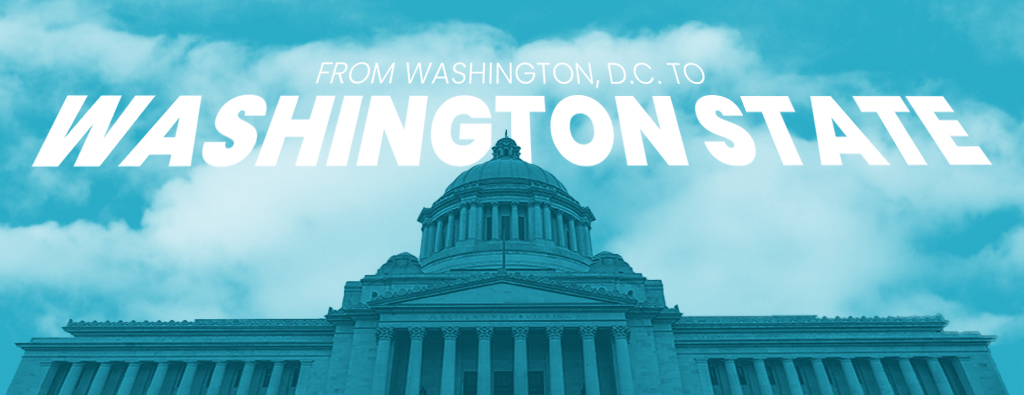 | | | GRIT Act Reintroduced in Congress Rep. Andrea Salinas and Sen. Richard Blumenthal have introduced the Gambling Addiction Recovery, Investment and Treatment Act, or GRIT Act for 2025. The legislation would dedicate federal funds from sports betting taxes to study, prevent and treat gambling addiction in the United States. There are currently no federal funds designated for problem gambling treatment or research in the United States, unlike the billions in funding for substance use disorders. The federal government levies an excise tax of 0.25% on all money wagered on sports in the United States, which is deposited in the general fund. The National Council on Problem Gambling (NCPG) estimates the federal excise tax revenue topped $150 million in fiscal year 2024. The GRIT Act would set aside 50% of the federal sports excise tax revenue for gambling addiction treatment and research. The legislation would authorize spending for 10 years and require the Secretary of Health and Human Services (HHS) to submit a report to Congress on the effectiveness of the program within three years of passage. | | Want to support the GRIT Act or need more information? Contact NCPG Government Relations Manager, Cole Wogoman (ColeW@NCPGambling.org). | | | | Gambling Diversion Court The Honorable Chris Stearns (D-Auburn), former Mayor of Auburn, former Commissioner and chair of the Washington State Gambling Commission, and current member of the House of Representatives, was joined by 15 of his colleagues in the Washington State House on the introduction of House Bill 1362 to create a gambling treatment diversion court. The bill language is identical to Substitute House Bill 2055, last year's version, which died in House Appropriations committee at the end of last session. The basic parameters of the bills would: -
Require a person to pay any victim restitution and the cost of the treatment program. If they do not have the financial resources to pay all the related costs, the court must arrange for that person to be assigned to a program that receives sufficient amount of federal or state funding to offset the remainder of the costs and/or could order the person to perform supervised community service. -
Upon completion of the treatment program, allow a person to have their conviction discharged and apply for a vacation of the record. If treatment is not successfully completed, the court could then impose a sentence for the offense. Representative Stearns, a proud and vocal member of the recovery community, testified in support of the bill before the House Committee on Civil Rights & Judiciary. Here is a link to the TVW coverage of the hearing beginning at 1:16. The policy committee has until Friday, February 28th to take action on the bill and send it to the appropriations committee for further consideration. Following a recent meeting with Representative Stearns, because of its perceived costs and the budget issues faced by the legislature, we understand it is not likely the bill will make it any further in the process this year. ECPG will continue to collaborate with Representative Stearns on the language and find some creative funding solutions to make therapeutic justice a reality. | | New RG Signage for Washington Cardrooms Last May, the Washington State Gambling Commission unanimously adopted WAC 230-06-068, requiring responsible gambling signage, provided by the Commission and created by the Evergreen Council on Problem Gambling, to be conspicuously posted at all entrances and exits into the gambling area and where cash or electronic transfers of funds are available. The rule also requires that all marketing communications must include responsible gaming messaging and the Helpline number. All marketing direct advertising and promotional communications must include a clear and conspicuous method allowing patrons to opt out or unsubscribe. Having a consistent message across state licensed venues will surely assist in helping with awareness that gambling can be a problem for some, and HELP IS AVAILABLE. ECPG has operated its Helpline at 1-800-547-6133 for more than 30 years as a lifeline resource for Washington residents. | | | | | | | | | | | | With more than eight years of experience in event planning and project management, ECPG’s new Training Event Coordinator, Emily Sabounchi, was ready to hit the ground running when she joined the staff this year. After running her own business in Washington for four years, Emily was inspired to join ECPG to make a positive impact within the nonprofit sector. “I’ve been a business owner for most of my career and found my passion in helping others as the main goal,” said Emily. “I wanted to extend that mission into a space where I could help bring awareness to an important issue and make an impact. Problem gambling is something I have personal experience within my family, and I’ve seen the impact and devastation it can cause. I am inspired by ECPG’s work in promoting awareness, prevention, and recovery, and I’m honored to be part of the team helping people reclaim their lives.” | | | | Emily had the opportunity to participate in ECPG’s Gambling Counselor Core Training in January and said she could see what worked for learners was the interactive experience, case-study exercises, and classroom networking with other providers regionally and across the country. Emily is already networking with experts in our field as she works to support the presenters who will be at ECPG’s Focus on the Future Conference from May 5-8 in Seattle. “I am also inspired by ECPG’s work with tribal communities, especially through initiatives like the Four Directions Conference,” Emily shared. “This event integrates cultural and spiritual aspects into problem gambling prevention and recovery, bringing together diverse communities. ECPG’s approach of collaborating with tribal nations resonates with my passion for inclusiveness and cultural respect.” Emily’s passions and inspirations also include exploration and personal growth, embracing transformation, and seeking out new experiences. She and her husband – and their four pets – are relatively new to the Pacific Northwest. Exploring, hiking, and camping, from the Olympic National Forest to the Oregon Coast, inspire them to find new places to discover in nature. Inspiration in her life and in her work also comes to Emily from her family. “My parents, as first-generation immigrants, have been the greatest inspiration in my life and work,” shared Emily. “They taught me resilience, the importance of hard work, and the ability to navigate life’s ups and down. Their sacrifices and perseverance have shaped my own drive and commitment to overcome obstacles and pursue my passions.” Thanks, Emily for sharing your passion with all of us and those we serve. | | | | | | Every thriving business needs a good bookkeeper and office manager – a role that requires the utmost attention to details. And those detail-oriented skills are exactly what ECPG’s Office Manager, Nolan Otto, takes great pride in bringing to his day-to-day work, whether creating detailed financial spreadsheets and reports or unearthing archived documents. These skills have always served Nolan well and he learned many of them through his previous work owning and managing an iconic business in Olympia, Washington – the San Francisco Street Bakery – a family business for more than 35 years and still operating today. During his nearly 20 years working at San Francisco Street Bakery, Nolan learned every detail needed to make the business a success, with roles as delivery driver and prep cook to his most prominent work as the company’s bookkeeper. | | | | | | Nolan has a keen interest in expanding his skills in accounting and bookkeeping as well as a desire to use those skills working for an organization making a positive difference in people’s lives. This is what drew him to ECPG. “Working for an organization that so directly helps people is of great interest to me,” Nolan explained. “Getting to provide support for such a great staff and clear the way for them to focus on their important work is exciting.” Nolan says the interests that excite him outside of work are too many to list, but he did share a few. “I love to build models, read, hike, and collect comics,” Nolan said. “Every leap year, I watch a movie for every day in the year.” And, like his list of interests, Nolan has watched and loved so many movies that it’s hard for him to choose a favorite. That said, he has a talent for dramatically describing a few of his favorites: “We can go with La Dolce Vita for its gorgeous cinematography, hauntingly relatable emotional landscape, and its unconventional narrative of a man ultimately failing in his struggle with his own darkness. Or maybe it’s Speed Racer! An at-times autobiographical examination of making commercial art metaphorized through the deranged, maximalist, and extremely specific generational shared language of 1970s cartoon reruns and racing video games. Or maybe It’ s High and Low. Kurosawa is definitely my favorite director. Or maybe…” It's clear that Nolan can focus on details that make a difference in all areas of his life interests and work, and all of us at ECPG welcome these skills as part of our team! | | | | | | | | | Evergreen Council on Problem Gambling
1821 4th Ave. E, | Olympia, Washington 98506
360-352-6133 | info@evergreencpg.org | | | | | | | | | |